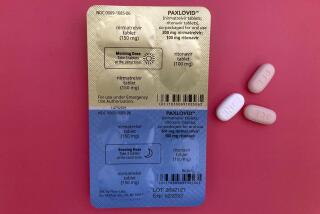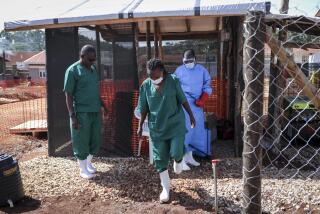A looming problem: How to ration Ebola vaccines and medicines
For doctors and public health officials trying to contain the Ebola epidemic, the dearth of drugs and vaccines is only part of the problem. Once these medicines become available, there certainly won’t be enough of them to go around.
So experts are devising ways to ration the precious products — and that forces them to ask some difficult questions:
Is the life of a physician worth more than a truck driver? Is a foreign aid worker more deserving of a vaccine than a nurse who lives in West Africa? Is it fair to turn thousands of at-risk people into clinical trial guinea pigs?
“It’s hard to know what’s the right thing to do,” said Dr. William Schaffner, an infectious disease expert and professor at Vanderbilt University.
Three vaccines and up to 10 medications are in various stages of development, according to health officials. If they aren’t distributed wisely, the epidemic could last longer, spread farther and claim unnecessary victims.
Whatever rationing strategy is adopted, there will be no time to waste in persuading the public to go along.
“The situation is already a tinderbox,” said Oliver Brady, a University of Oxford epidemiologist. “The decisions have to be made now.”
If Ebola drugs were plentiful, as many as 30,000 people would have been eligible to receive them so far, Brady argued last month in the journal Nature. The World Health Organization estimates that more than 20,000 people will be infected before the outbreak is brought under control, but some epidemiologists believe that number could be much higher.
So far, at least 4,985 people have been sickened with Ebola and at least 2,461 have died, according to the WHO.
Ebola is transmitted through bodily fluids such as blood, urine and vomit. That makes doctors, nurses and other caregivers extremely vulnerable to infection.
But the risk doesn’t stop there. Laboratory technicians, janitors, clerks and other staff at medical facilities could be exposed, as could funeral workers who prepare victims’ bodies for burial.
The virus does its dirty work by prying its way into cells and mass-producing copies of itself. Those copies then spread to other cells, unless the immune system can mount a defense.
Vaccines work by helping the immune system recognize specific invaders, so that the body can overwhelm them if it encounters them in the future. They must be given before a patient becomes infected.
The two leading Ebola vaccine candidates alert the immune system to a unique glycoprotein on the surface of the spaghetti-shaped virus. One uses a genetically altered chimpanzee cold virus that trains immune cells to seek and destroy cells that have already been infected. The other uses a lab-modified livestock virus that triggers the formation of antibodies that can prevent the virus from attaching to cells.
The cold virus vaccine is now in human safety trials. If it passes, the first 10,000 doses could be delivered in November.
The second vaccine could begin testing in humans in a few weeks. If all goes well, 800 doses could be made available.
A third vaccine that uses a modified human cold virus won’t be ready for human trials until fall 2015.
In the context of the current outbreak, those numbers are very small, Schaffner said.
Traditionally, vaccines are distributed in an ever-enlarging circle surrounding the location of an outbreak. Those who live closest to an infected individual are vaccinated first, then neighbors, and then outlying groups.
But with limited supplies, an expert panel organized by the WHO recommended that healthcare workers and those who collect and dispose of bodies receive top priority for vaccination.
“Ten percent of healthcare workers are dying,” said Dr. Samba Sow, director general of Mali’s Center for Vaccine Development, which will be conducting trials of the cold virus vaccine. “Health workers now are scared to come to health centers to treat and take care of patients. If you vaccinate them ... it will help the countries to have health workers remain at the health centers.”
Giving vaccines to front-line responders would also be a good way to test their effectiveness, said Marie-Paule Kieny, assistant director general of the WHO.
Even among this group, choices will have to be made. The WHO has estimated that 12,000 local healthcare workers and 750 foreign experts — including epidemiologists, biohazard teams and public health workers — will be needed to fight the epidemic.
Once this first group is vaccinated, some health experts argue that police and military personnel should be next in line, to bolster their ability to maintain order in a time of crisis.
But others fear this could fuel unrest.
“Giving the military and police immediate priority would just send a message that we need to contain people rather than taking care of them,” said Nancy Kass, a bioethicist at Johns Hopkins University who was not part of the WHO discussions.
In her view, it would be better to prioritize people who keep basic services going. “People really start to panic if the radio goes dead or the supermarket has no food on the shelves,” she said.
The calculus is different for experimental drugs designed to treat Ebola.
The WHO committee decided it would be ethical to offer untested drugs to patients, as long as recipients are told that the drugs might not work and could potentially do more harm than good. Patients who elect to take them would be tracked to help researchers evaluate their effectiveness, Kieny said.
Between five and 10 medications are in the pipeline, including Zmapp, which has already been given to seven doctors and foreign aid workers. Some have questioned the ad hoc nature of the drug’s distribution, asking why African patients did not get priority. Others, including Kass, oppose the use of experimental drugs entirely.
“The risks of something going wrong are real,” she said. And if a highly touted drug turns out to be a failure, people may lose faith in the health system. “You lose all this public trust.”
Sick medical personnel are likely to be given priority when it comes to experimental treatments. But WHO officials have yet to agree on the details.
The protocol should be designed to demonstrate the extent of a drug’s effectiveness — or lack thereof — as quickly as possible, said Dr. Jesse Goodman, a WHO panelist and director of Georgetown University’s Center on Medical Product Access, Safety and Stewardship.
The current outbreak has a mortality rate of about 53%. So to get an early read on whether a drug is working, it would help to give it to a very broad spectrum of patients, experts say.
“You want to learn as much as you can as fast as you can,” said Dr. Steve Goodman, a clinical trials expert at Stanford University who was not on the WHO panel.
Whatever is decided, the process is likely to be far from perfect, Schaffner said.
“Politicians will want to sneak themselves and their families to the head of the line. Money will be changing hands,” Schaffner said. “That’s part of the reality.”
Twitter: @montemorin







